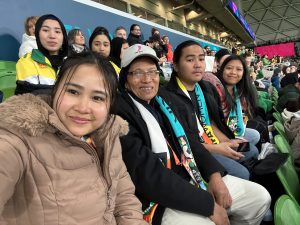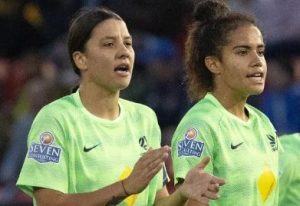Matildas inspiring CALD youth
Australiaد Matildas footballers are inspiring young people from diverse communities across the country.
Sam Kerr and Mary Fowler particularly have become role models for diverse youngsters with sporting dreams.
Ms Kerr’s father was born in Kolkata to Anglo Indian parents who migrated to Western Australia in the 1960s. Her position as a role model to the next generation of footballers is something she takes seriously.
“My Indian heritage is something I’m really proud of and I know my nanna’s really proud that I’m representing young Indian girls whenever I go out there and play,” she said in a 2021 interview.
Ms Kerr is the Matildas, who had a record breaking run in the recent Women’s World Cup reaching the semi-finals.
 As well as Ms Kerr, there is Mary Fowler, whose mother was born in Papua New Guinea, and Indigenous players like Anaiwan woman Kyah Simon and Noongar goalkeeper Lydia Williams.
As well as Ms Kerr, there is Mary Fowler, whose mother was born in Papua New Guinea, and Indigenous players like Anaiwan woman Kyah Simon and Noongar goalkeeper Lydia Williams.
Players across the Pacific have been inspired by Mary Fowler, whose mother comes from the village of Kira Kira in Papua New Guinea.
In an Instagram post, Fowler said the support from the village touched her heart and made her “so proud to be Papuan”.
Her uncle, Rabura Geita, told the ABC that there usually was not much interest in soccer in the village, where rugby league and volleyball are more popular.
“But because of my niece Mary Fowler, the whole village is involved in participating and watching the games,” he said, saying people with large-screen TVs would bring them out onto the street so the whole village could support her.
Founder and director of the Women’s Coaching Association (WCA) Aish Ravi said seeing players from diverse communities compete at such a high level helped to dismantle stereotypes about who was seen as a typical footballer and could help “rewrite the possibilities”.
“Seeing somebody of Indian heritage, of colour, playing on the world stage – one of the best players on the planet – it’s incredible, it’s inspiring, it shows that anything’s possible,” she said of Ms Kerr.
 The WCA’s mission is to encourage and empower women and girls to coach sport by supporting them and sports organisations through network opportunities, education, strategies and the expertise to develop and create change.
The WCA’s mission is to encourage and empower women and girls to coach sport by supporting them and sports organisations through network opportunities, education, strategies and the expertise to develop and create change.
Ms Ravi said growing up, there were cultural barriers that prevented her from participating in mainstream sport, including a culture of prioritising academic achievement over sport, in pursuit of economic and career stability.
“Instead of spending my Saturday mornings playing on a football pitch, I spent them often in tutoring centres trying to master maths and English,” she said.
“I wasn’t really encouraged to go out and play in the sun, I guess because your skin would get darker.”
Ms Ravi, who is also completing a PhD at Monash University on the lived experience of women football coaches, said more needed to be done to give female players job prospects in coaching or media after their retirement from professional football, and to combat homophobia and racism.
The latter is something she has experienced personally.
“I was racially vilified while playing football last year … it’s never the same after you’ve encountered something like that,” she said.
“Stepping out on the field has a different meaning … those memories stay with you and they haunt you,” Ms Ravi said.
Local Altona junior player Priya Patel, whose parents are from India, says that Sam Kerr’s success has inspired her to chase her dreams
“At first I didn’t really see many people who were from my background playing soccer. But when I saw Sam Kerr, it just made want to chase my dreams and try to achieve my goals,” she said.
“She’s my favourite player and she makes me feel I can do what she is doing,” Priya said.












